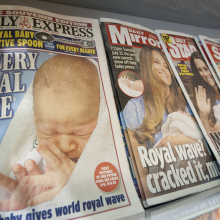Abu Ghraib
With his anti-Muslim rhetoric and planned travel bans, you’d think President Trump would be a favorite target for Islamic State’s propaganda. The jihadist caliphate in Syria and Iraq must be pulling out all the stops to slam him as the epitome of Islamophobia.
Well, think again. The extremist group that Trump vows to “totally obliterate” has hardly printed or broadcast a word about him since before the November election. The caliphate’s Ministry of Media acts almost as if he didn’t exist.
Going it Alone
Joshua Casteel served as an interrogator in Iraq. Then an encounter with a Jihadist challenged him to truly live out his faith.
LATELY I’VE been reading my dead friend’s files. That’s how I know that he often typed in Cambria. That’s how I know that he drafted beginning-to-end, reworking early paragraphs before he set down the next—which is why so much of his writing just stops. That’s how I know that as a child he held press conferences in a White House made of cardboard boxes, wearing a clip-on tie, and that the night before he began school at West Point (a school he’d soon leave), he and his father smoked cigars on a hill overlooking the Hudson River, though his father did not like cigars. That’s how I know how much he thought about pain, which to Heidegger is “the rift,” a “separating that gathers,” and to Wittgenstein is “a having, not a knowing,” and to Elaine Scarry is an “objectless experience” that “destroys language.”
This thinking was for classes at the University of Iowa and the University of Chicago, and this thinking was for other people, namely prisoners and fellow soldiers in the War on Terror, which was also the Global War on Terrorism, and was the Iraq War and is still the War in Northwest Pakistan and the War in Afghanistan, a subset of which is “Operation Enduring Freedom,” and is also and continues to be World War III or World War IV, depending on how you count, and was once The War Against Al-Qaeda and is now the Overseas Contingency Operation, which has been tidily renamed CVE (Countering Violent Extremism).
Joshua Casteel was sent to the Long War after first enlisting in the Army Reserves as a high school junior in Cedar Rapids, Iowa. Seven years later he was stationed at Abu Ghraib prison as an interrogator and linguist. This is where he became convicted that he could no longer be an “American war fighter,” which he saw as treason against his “real kingdom and home.”
By now most of the world knows the royal family in England is celebrating the birth of little baby George Alexander Louis. The commentators panted as they caught the first glimpses of the magic baby, about everything from the infant's apparent ability to withstand a media onslaught to the ever-so-newsworthy fact that his father drove the family home with his own two hands.
Meanwhile in Iraq, several hundred prisoners of the infamous Abu Ghraib facility escaped, many of whom were known or suspected members of Al Qaeda. Considering the attention given to the few dozen detainees still held in Guantánamo Bay, it seems reasonable to think that such a breakout would arrest the headlines around the globe.
But instead, we stayed focused for the most part on baby George. I remarked about this to my friend, sharing my concern about the apparent distortion of priorities. He suggested that it simply is a sign of cultural fatigue, or even resignation. Sometimes, after all, these stories that have international importance seem so big, so abstract, and so far away that it is hard to wrap our minds around them. It’s easier instead to set our attention on something more hopeful — albeit remarkably more superficial — that won’t keep us awake at night.
You remember Abu Ghraib: the correctional facility in Baghdad where such atrocities took place that the prison’s very name is now synonymous with and shorthand for torture, degradation, military scandal, and unchecked American hubris.
A young army reservist named Lynndie England came to represent the horror of that dark chapter (one of several, as it turned out) of the war in Iraq. Photographs of England posing with abused Iraqi detainees led to a dishonorable discharge, a felony conviction, and a two-year prison sentence. Also revealed during and after the shame of Abu Ghraib was England’s own status as both a co-conspirator and an unwitting casualty. She was not a victim in the same way that the Iraqi prisoners were but, given her rank, gender, background, and the weird sexual dynamics she shared with the scandal’s ringleader (and father of the baby she would give birth to a few months later), England’s culpability, like that of many who commit heinous acts, was not separable from her own troubled life.
In the tidy way we like these narratives to play out, England was supposed to pay her dues for the evil she had done and, with time for reflection and introspection, own her guilt and express her sorrow. Or at least, for public consumption, she was supposed to voice regret for the tragic choices she made back in 2003 and offer an apology to those whom she had wronged. But in a recent interview, England was unrepentant. Her only regret, it turns out, is that her actions at Abu Ghraib may have directly caused American casualties.
On the first day of the Obama administration, our newly elected president signed the order to close down Guatanamo. Scores of human rights advocates were in ecstasy. For those of us committed to peace and social justice, the words Guatanamo and Abu Ghraib invoke images of shock and horror. How could we as a nation have stooped so low? Where was the outcry from the Body of Christ?



